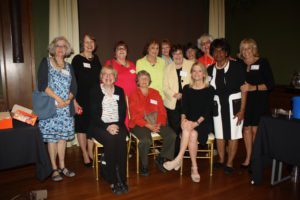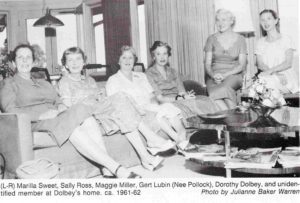WCC has had an impressive history, and its future is full of possibilities.
Founded back in 1915...
The Woman’s City Club of Greater Cincinnati has been called one of the most influential organizations in the city. Established during an historic time when courageous public-spirited women were uniting in their fight to secure the right to vote, women sought out meeting spaces where their voices could be heard and where they could find support as they worked together to shape change in the city. In the early years of its formation, City Club organized itself to mirror the committees of City Council. WCC committees served as “watch dogs” for council committee and held them accountable. To report their findings, the club issued a Report Card for City Government, published in the Cincinnati Post. Over the years, the club became involved in charter reform and restructuring election methods for city and county government to ensure better representation.
In the early twentieth century...
WCC forums on city planning led to the first City Planning Department in the United States. WCC advocated for support for social work and human services in the city and county. WCC hosted weekly forums to raise public awareness about the need to target housing for low-income women. They advocated for women in building and property management trades. WCC’s work in city planning led to the development of housing projects to replace “shanties” and ”blight.” Members hosted a domestic violence prevention luncheon with the Rape Crisis & Abuse Center and the YWCA. WCC was a pioneer in race relations during the 1940s when Cincinnati (“a northern city with a southern exposure”) remained racially segregated even though legal restrictions had been lifted 30 years earlier.
 Throughout the century...
Throughout the century...
WCC advocated for minorities, children, families, low-income women, and other victims of social and economic injustice. Fostering civic reform and social justice, inclusiveness and diversity, WCC worked hard to promote peace and harmony among the diverse cultures that make up our neighborhoods. We sought to empower those who are most vulnerable and facilitate productive dialogue between the socio-economic sectors of our community. Boosting the status of women provided a central focus of civic action. We were committed to providing fair and affordable housing, improving our schools, securing safety in the streets, enhancing the health and sustainability of the urban environment, and supporting the life of the arts.
As Andrea Kornbluh wrote in Lighting the Way, her history of WCC 1915-1965, "... as in so many of its civic concerns, the Woman's City Club based its program on its vision of a better world, rather than on the contemporary status quo." (p. 71)
In the twenty first century and today...

We remain dedicated to the vision and commitment of our first members a hundred ten years ago. Through our forums and townhalls to educate the public on important issues, leadership workshops, annual national speaker forums, action groups, monitoring of City Council and the State Assembly, and Marian Spencer Education Awards, we continue to see our role in the city as a catalyst for community participation and connection. The timeline on the right illustrates WCC’s commitment to shaping change in our region for more than a century.
To learn more about our history and accomplishments, consider consulting two histories WCC commissioned that document the century of its service. Both are available in the public library.
Andrea Tuttle Kornbluh, 1986. Lighting the Way: The Woman’s City Club of Cincinnati, 1915-1965, Young & Klein, Cincinnati, Ohio.
Rachel E. Powell, 2015. Lighting the Fire, Leading the Way: Woman’s City Club of Greater Cincinnati 1965-2015, Woman's City Club of Greater Cincinnati, Cincinnati, Ohio.
WCC's archived newsletters ("The Bulletin") are also resources.
Timeline
Use the plus "+" to expand and show the events for the time period.

